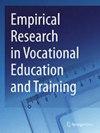The correlation between vocational school students’ test motivation and the performance in a standardized test of economic knowledge: using direct and indirect indicators of test motivation
IF 3.1
Q2 EDUCATION & EDUCATIONAL RESEARCH
Empirical Research in Vocational Education and Training
Pub Date : 2018-10-15
DOI:10.1186/s40461-018-0071-x
引用次数: 0
Abstract
BackgroundIn this study, the correlation between test motivation and performance on an economic knowledge test was investigated. To this end, the economic knowledge of 1018 students in vocational schools in Germany was assessed using a standardized test, and their self-reported test motivation and interest in receiving feedback on their performance on the test functioned as indicators of test motivation. The expectancy-value model served as the theoretical basis, while this paper followed Knekta and Eklöf (J Psychoeduc Assess 33(7):662–673, 2015) and focused on invested effort in particular. Further, the number of missing values on the test was examined as a potential external criterion for test motivation. The correlation between gender and test motivation being a subject of frequent discussion in the literature, gender was incorporated as a control variable into the modeling.Methods and resultsThree structural equation models of the results show that self-reported test motivation (direct indicator) and the number of missing values on the test (external criterion) correlated significantly with the economic knowledge test score achieved. Interest in receiving feedback (indirect indicator) had no significant correlation with the economic knowledge test score. However, there is a positive correlation between interest in receiving feedback and self-reported test motivation. The analyses taking into account gender show that there is no correlation between gender and interest in receiving feedback or gender and self-reported test motivation. There are, however, correlations between gender and the economic knowledge test score as well as between gender and the number of missing values.ConclusionsThe findings underline the importance of a differentiated view on the assessment of correlations between test motivation and test performance. Thereby, dividing indicators of test motivation into direct (self-reported test motivation) and indirect (interest in receiving feedback) indicators, as well as taking into account the external criterion (number of missing values), in particular, were seen as the value added by this study.职业学校学生的考试动机与经济知识标准化测试成绩之间的相关性:使用考试动机的直接和间接指标
背景本研究调查了考试动机与经济知识测试成绩之间的相关性。为此,研究人员使用标准化测验对德国职业学校 1018 名学生的经济知识进行了评估,并以他们自我报告的测验动机和对获得测验成绩反馈的兴趣作为测验动机的指标。本文以期望值模型为理论基础,同时遵循 Knekta 和 Eklöf (J Psychoeduc Assess 33(7):662-673, 2015)的观点,特别关注投入的努力。此外,本文还将测试中缺失值的数量作为测试动机的潜在外部标准进行了研究。方法与结果三个结构方程模型的结果表明,自我报告的考试动机(直接指标)和考试缺失值的数量(外部标准)与经济知识考试成绩显著相关。对接受反馈的兴趣(间接指标)与经济知识测试成绩没有明显的相关性。然而,接受反馈的兴趣与自我报告的测试动机之间存在正相关。考虑到性别因素的分析表明,性别与接受反馈的兴趣或性别与自我报告的测试动机之间 没有相关性。然而,性别与经济知识测试得分之间以及性别与缺失值数量之间存在相关性。因此,将考试动机指标分为直接指标(自我报告的考试动机)和间接指标(对接受反馈的兴趣),并考虑到外部标准(缺失值的数量),尤其被视为本研究的附加值。
本文章由计算机程序翻译,如有差异,请以英文原文为准。
求助全文
约1分钟内获得全文
求助全文
来源期刊

Empirical Research in Vocational Education and Training
Social Sciences-Education
CiteScore
3.40
自引率
7.70%
发文量
9
审稿时长
13 weeks
期刊介绍:
The main focus of this journal is to provide a platform for original empirical investigations in the field of professional, vocational and technical education, comparing the effectiveness, efficiency and equity of different vocational education systems at the school, company and systemic level. The journal fills a gap in the existing literature focusing on empirically-oriented academic research and stimulating the interest in strengthening the vocational part of the educational system, both at the basic and higher education level.
 求助内容:
求助内容: 应助结果提醒方式:
应助结果提醒方式:


